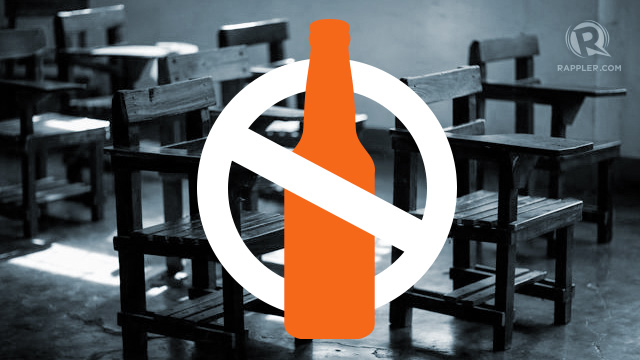SUMMARY
This is AI generated summarization, which may have errors. For context, always refer to the full article.

MANILA, Philippines – A bill proposing the ban of soft drinks and other unhealthy beverages in all schools was filed on Wednesday, February 26 by two congresswomen and a 10-year-old boy.
House Bill 40201 or the “Healthy Beverage Options Act of 2014” bans the sale of the following beverages deemed unfit for children:
- Soft drinks, sports drinks, punches, iced teas
- Fruit-based drinks that contain less than 50% real fruit juice or contain additional sweeteners
- Drinks containing caffeine, excluding low-fat or fat-free chocolate milk
The act covers all schools, from kindergarten up to high school, both private and public. It also requires schools to provide free potable water for all school personnel, staff, and students.
Schools are also tasked to educate students about the health impacts of consuming unhealthy foods and drinks. Such lessons must be incorporated into curriculum lessons.
Many Filipino kids are fond of sodas because of their sweet flavors and cheap prices. They are also practically ubiquitous in the Philippines – among street vendors, sari-sari stores, and in advertisements.
Children who cannot afford meals usually buy chips as an alternative, and they often pair these snacks with a bottle or two of their favorite sodas.
But how do these sugary drinks affect children’s health?
Bad effects of soda
Carbonated or soft drinks are rich in sugar, caffeine, artificial sweeteners, and carbonic acids which can be harmful to health. Soft drinks are also linked to obesity, kidney and liver damage, elevated blood pressure, teeth erosion, and stomach problems.
A 2007 study from Yale University linked soda consumption to a decrease in calcium, higher risks of Type II diabetes, higher caloric intake and body weight.
Frequent soda consumption is also linked to developing an “inefficient metabolism,” according to a 2013 study from Bangor University in North Wales published in the European Journal of Nutrition. The study suggested that soft drinks can interfere with the “body’s ability to burn fat and handle rises in blood sugar.”
Meanwhile, a 2012 study from the University of Oregon and Michigan State University found that children aged 3-5 years old, who consumed sugary drinks, tended to avoid vegetables and preferred snacks high in calories and sodium like potato chips.
A 2008 study from the University College London suggested that soda drinkers are more likely to develop a habit of unnecessary consumption of sugary drinks and an increased preference for sweets.
Other studies have linked regular soda consumption to pancreatic cancer.
Doctors also warn parents of “fruit, sports, or energy drinks” marketed as healthy drinks, but actually contain excessive sugar and calories.
Cynthia Canonicato, nutritionist-dietitian from the Philippine Children’s Medical Center (PCMC), said that each bottle of energy drink contains around 50 mg of caffeine – which is even higher than coffee. Each bottle contains around 1,000 mg of Taurine, of which a child needs only 1-10 mg/day.
Healthier students
Euromonitor International, a research firm, said that the growing popularity of sports in the Philippines stimulated the demand for soft drinks. As a marketing strategy, manufacturers sponsored sports events and hired sports celebrities to endorse their brands.
Ironically, some of these drinks are not even healthy.
The “Healthy Beverages Act of 2014” aims to educate more students on proper diet and nutrition. It encourages school canteens to sell the following beverages:
- Fruit-based drinks with no additional sweeteners
- Water and seltzer
- Low-fat or fat-free milk; including chocolate milk, soy milk and rice milk
The Department of Education (DepEd) and the Department of Health (DOH) are supposed to be in charge of implementation. As proposed in the bill, schools will be fined P100,000 for every violation.
At present, DepEd is also implementing its own guidelines on canteen operations – which also bans the sale of junk food.
Boy against soft drinks
The bill was filed by Representatives Kaka Bag-ao (Dinagat islands) and Leni Robredo (Camarines Sur, 3rd district), together with Daniel “Chip” Gatmaytan, a 10-year-old boy.
Gatmaytan first made headlines in 2011 for promoting children’s health, which was part of a school project. His advocacy then inspired Senator Miriam Santiago to file Senate Bill 3134 or the “Healthy Beverage Options Act of 2011.” Nothing came out of the proposed bill.
Gatmaytan was also involved in the filing of HB 4268 (Healthy Beverage Options Act of 2011), with Bag-ao and Representative Walden Bello. He also urged the Quezon City government to regulate children’s access to soft drinks.
The 10-year-old is once again hoping to improve the status of school canteens and children’s nutrition. Hopefully this time, his advocacy will no longer remain a proposal, but finally become a law. – Rappler.com
Add a comment
How does this make you feel?
There are no comments yet. Add your comment to start the conversation.